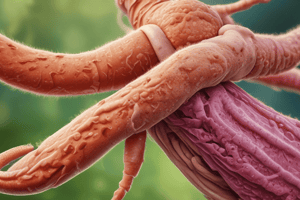Podcast
Questions and Answers
How can fungal infections be contracted through direct contact?
How can fungal infections be contracted through direct contact?
By touching an infected surface and then touching the skin or mucous membranes.
What is one way fungal infections can be contracted indirectly?
What is one way fungal infections can be contracted indirectly?
By touching an infected individual's personal items, such as towels or combs.
What is a common cause of respiratory fungal infections?
What is a common cause of respiratory fungal infections?
Inhalation of fungal spores.
How can a weakened immune system affect susceptibility to fungal infections?
How can a weakened immune system affect susceptibility to fungal infections?
Signup and view all the answers
What is a systemic antifungal medication used for?
What is a systemic antifungal medication used for?
Signup and view all the answers
Study Notes
Fungal Infections: Understanding Prevention, Causes, and Treatments
Fungal infections, caused by organisms from the kingdom Fungi, are a common and diverse group of diseases affecting humans. Although they're often less serious than bacterial infections, fungal infections can lead to discomfort, complications, and even life-threatening conditions in some cases.
Prevention Methods
Prevention is a critical part of managing fungal infections. Some strategies to reduce the chances of developing these infections include:
-
Maintain good hygiene: Regularly washing hands, especially after contact with soil, animals, or other potentially contaminated surfaces, can help prevent infection.
-
Maintain a healthy immune system: A strong immune system is vital in preventing infections of all types, including fungal infections. A balanced diet, regular exercise, and proper sleep hygiene are all important for maintaining good health.
-
Keep skin clean and dry: Fungi often thrive on moist skin, leading to infections such as athlete's foot and ringworm. Keep skin dry by wearing breathable clothing and changing out of wet clothing promptly.
-
Avoid walking barefoot in public areas: Public spaces like locker rooms, gyms, and pools can harbor the fungi that cause infections. Wear protective footwear in these environments.
-
Avoid contact with others' personal items: Do not share personal items like combs, towels, or shoes with others to avoid spreading fungal infections.
Common Causes
Fungal infections can be contracted through various means, including:
-
Direct contact with fungi: The most common way to contract a fungal infection is by direct contact with the fungus or fungal spores. For example, touching an infected surface and then touching the skin or mucous membranes can lead to infection.
-
Indirect contact: Fungal infections can also be contracted indirectly, for instance, by touching an infected individual's personal items, such as towels or combs.
-
Inhalation of fungal spores: Certain airborne fungi can cause respiratory infections when inhaled.
-
Weakened immune system: Individuals with compromised immune systems are more susceptible to fungal infections because their immune systems are less effective in combating these organisms.
Treatment Options
Effective treatment for fungal infections varies depending on the severity and type of infection. Some common treatment options include:
-
Topical antifungal medications: These medications are applied directly to the skin or nails to treat infections such as athlete's foot, ringworm, and yeast infections.
-
Oral antifungal medications: These medications are taken by mouth and can be more effective for treating systemic fungal infections, such as those affecting the blood, lungs, or other organs.
-
Antifungal creams: These creams or ointments are applied to the affected area to help clear up fungal infections.
-
Antifungal shampoos: These shampoos are used to treat scalp infections, such as tinea capitis.
-
Systemic antifungal medications: These medications are taken by mouth or intravenously and are used to treat severe fungal infections that affect internal organs or the bloodstream.
In conclusion, fungal infections are common but preventable diseases that can be treated effectively in most cases. Understanding prevention methods, common causes, and treatment options is crucial in combating these infections and maintaining good health. Keeping a healthy lifestyle, practicing good hygiene, and being aware of potential risks can help reduce the likelihood of developing fungal infections.
Studying That Suits You
Use AI to generate personalized quizzes and flashcards to suit your learning preferences.
Description
Test your knowledge on fungal infections by exploring prevention methods, common causes, and treatment options. Learn how to reduce the risk of developing fungal infections, understand how they are contracted, and discover the various treatment options available.




